





Qualifying leads focuses your efforts on high-potential prospects.
By the way, we're Bardeen, we build a free AI Agent for doing repetitive tasks.
If you're in sales, you might love Bardeen's AI for sales. It helps with prospecting, lead generation, and email outreach. Use it to save time and focus on high-value leads.
Qualifying leads in sales can make or break your success. By properly vetting prospects, you can focus your time and resources on those most likely to convert, while avoiding wasted effort on those who aren't a good fit.
In this step-by-step guide, you’ll learn how to build a working sales lead qualification system. I’ll even show you some of the most popular frameworks to adopt.
Sales lead qualification is a systematic process in which revenue teams evaluate leads to determine if they are a good fit. The goal is to decide which leads are most likely to become customers so that sales teams can spend their time efficiently and focus on deals with a higher probability of closing.
Sales lead qualification is an ongoing process performed throughout the sales process. Many different frameworks exist for various situations, including BANT, MEDDIC, FAINT, ANUM, CHAMP, and others.

Two-thirds of lost sales are due to a lack of proper lead qualification, resulting in substantial wasted time and resources. However, companies that effectively qualify and nurture leads enjoy a 45% increase in their lead generation ROI compared to competitors.
Qualifying sales leads is crucial for several reasons:
With a solid lead qualification process, sales teams can prioritize their efforts on the most qualified leads, ultimately driving more revenue with less wasted time and resources. Automating lead qualification can help streamline this process, saving you time and ensuring consistent results.
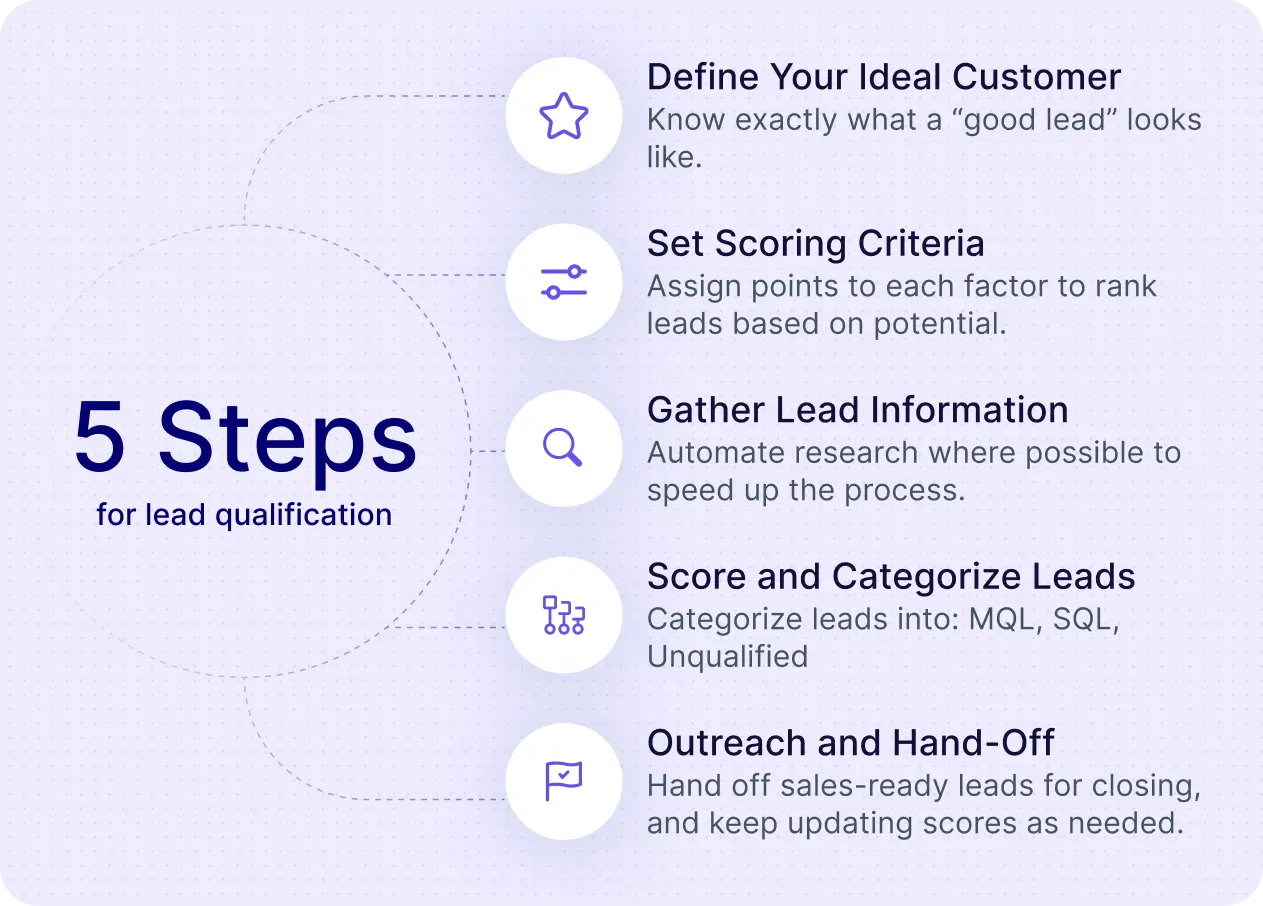
Lead qualification requires a structured approach to identifying and prioritizing qualified leads that align with your business goals. In the sections below, I’ll show you how to qualify leads step-by-step.
Qualifying leads in sales is a systematic process that involves several key steps. By following these steps and using automation where possible, you can focus on qualified leads who are most likely to convert.
Here’s how to qualify a lead in sales:
Following these five steps, you can identify the most promising prospects and help your sales team focus their efforts for maximum impact.
A lead qualification criteria is a specific indicator used to determine the quality of a lead. Different frameworks use different criteria to determine lead quality. For example, the BANT framework uses Budget, Authority, Need, and Timeline, while the CHAMP framework uses Challenges, Authority, Money, and Prioritization.
Each framework emphasizes different aspects of the qualification process depending on the sales context, the complexity of the product or service, and the target audience.
How do you qualify a lead? A lead qualification checklist will help you determine whether a lead is worth pursuing.
Your checklist should cover all the characteristics that describe your ideal customer. At the very least, it should cover the most basic requirements needed to make a purchase. Here is a list of five questions you can use to start building your lead qualification checklist:
This checklist is a good starting point, but you may wish to add to it. Think about all the characteristics that describe your ideal customer, and make sure to cover those in your checklist. You should be able to check all or most of the boxes. If you can’t, it may be time to focus on a different lead.
Lead qualification is a structured process that involves several steps. From acquiring leads to handing them off to the sales team, it’s important to understand what happens at each stage in the process.
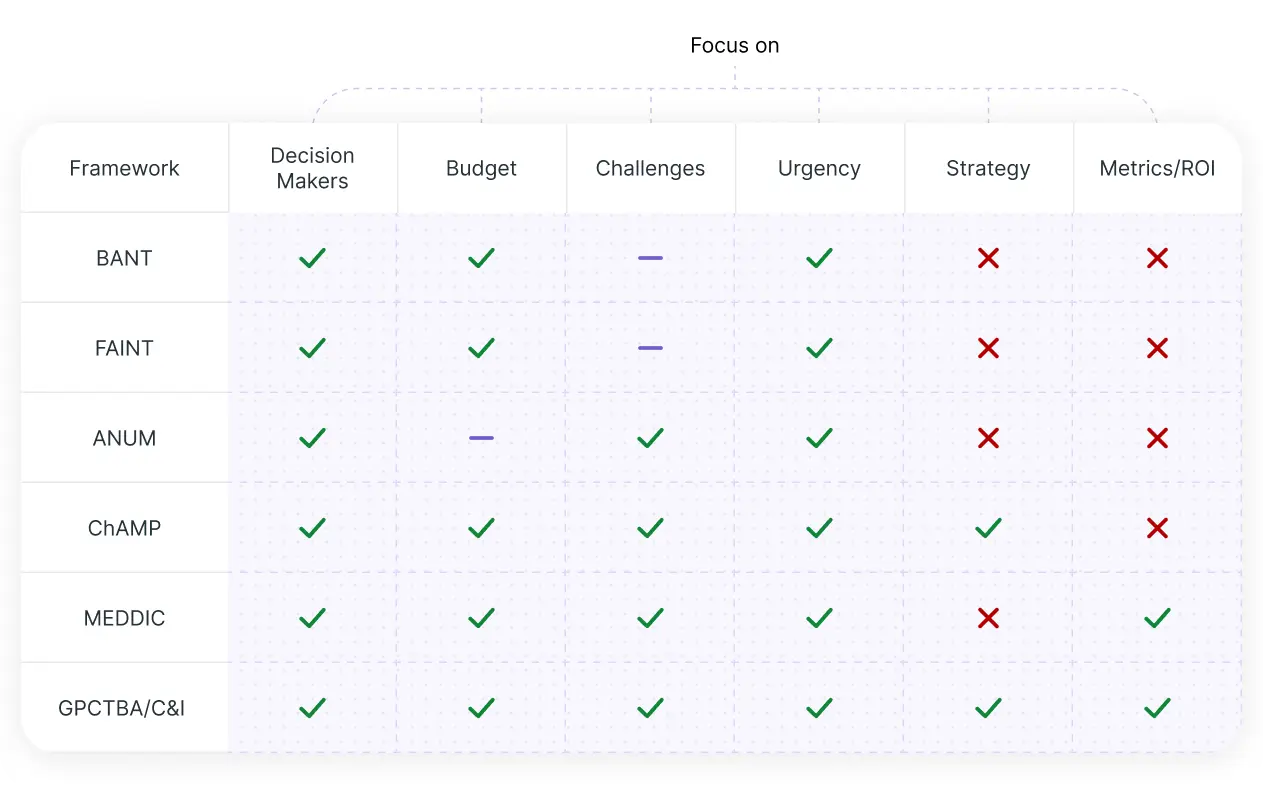
When it comes to developing a lead qualification strategy, you don't have to start from scratch. Several well-established frameworks can guide your approach, each with its strengths and ideal use cases.
The BANT bant lead qualification framework, pioneered by IBM, assesses leads based on Budget, Authority, Need, and Timeline. It's a straightforward approach that works well for businesses new to lead qualification, particularly in B2B sales scenarios involving larger organizations.
Here is a breakdown of each qualification criterion in the BANT lead qualification framework:
The MEDDIC sales methodology is a nuanced approach that helps understand the customer's decision-making process and economic viability. The MEDDIC sales process is ideal for companies selling software, technology, or B2B solutions that involve significant investment and complex decision-making.
What does MEDDIC stand for? Metrics, Economic Buyer, Decision Criteria, Decision Process, Identify Pain, and Champion. Here is a breakdown of each qualification criterion in the MEDDIC sales methodology:
The FAINT framework prioritizes Funding, Authority, Interest, Need, and Timing. It's streamlined and comprehensive, ensuring effective use of time and resources. FAINT is ideal for companies offering services or products that require significant customer investment, such as technology solutions or consulting services.
Here is breakdown of each qualification criterion in FAINT:
The ANUM framework prioritizes identifying decision-makers first, while still ensuring there’s a legitimate need, urgency, and budget for the solution. It is especially useful for organizations who want to maximize efficiency and spend more time with high-potential leads.
Here is breakdown of each qualification criterion in ANUM:
The CAMP lead qualification framework emphasizes Challenges, Authority, Money, and Prioritization. Focusing on identifying and solving leads' challenges enables sales teams to qualify prospects quickly. ChAMP is best suited for businesses marketing solutions to specific pain points, especially in complex B2B sales situations.
Here is breakdown of each qualification criterion in the ChAMP lead qualification framework:
THE GPCTBA/C&I framework is designed to uncover not just the surface-level needs but also the underlying business motivations. It emphasizes building stronger relationships rather than pushing a product. This is especially well-suited for complex B2B sales processes where a consultative approach to selling is needed.
Here is breakdown of each qualification criterion in GPCTBA/C&I:
Using these major lead qualification frameworks and understanding their strengths, you can select the approach that best aligns with your business needs and sales process.
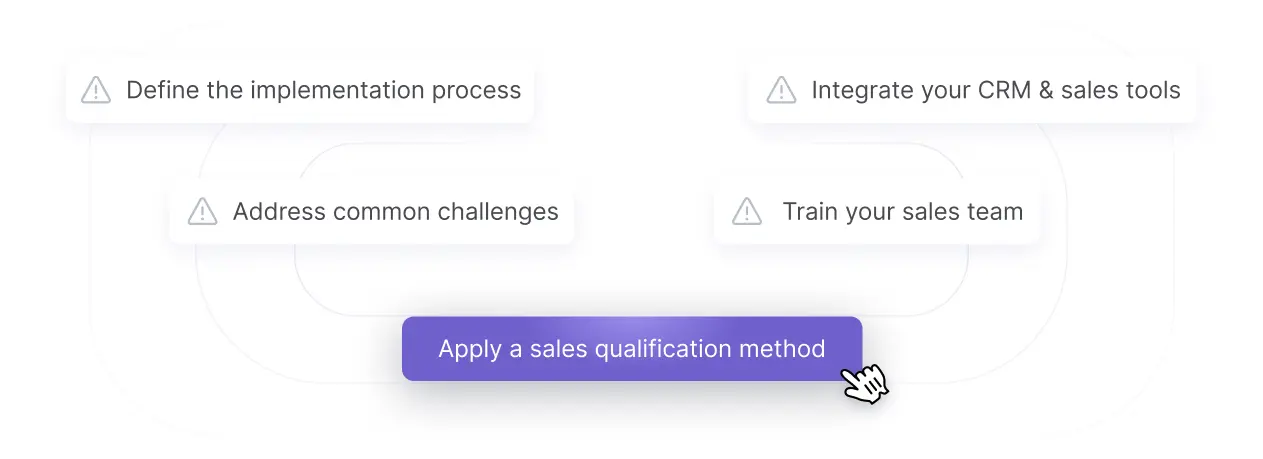
Implementing a sales qualification methodology requires careful planning and execution to ensure that your sales team can effectively use the chosen framework to identify and pursue the most promising leads. By following a structured approach and providing adequate training and support, you canintegrate any methodology into your sales process and start seeing results.
The first step is to outline the specific steps involved in the process. This typically includes:
With each step clearly defined, you can ensure a smooth and organized implementation that minimizes disruptions to your sales operations.
Once you've selected a sales qualification framework, providing comprehensive training to your sales reps is crucial. This ensures they understand the lead qualification criteria, know how to ask the right questions, and can effectively apply the methodology in their day-to-day interactions with prospects.
Training should cover not only the mechanics of the framework but also best practices for engaging prospects and uncovering key information. Consider using role-playing exercises and real-world examples to help reps build confidence and proficiency in using the methodology.
To maximize the impact of your sales qualification methodology, integrate it into your existing CRM system and sales tools. This allows reps to easily access and update lead qualification criteria, track progress, and share insights with the rest of the team.
Look for ways to automate sales prospecting, such as using custom fields or workflows in your CRM. This can save time and ensure consistency in evaluating and prioritizing leads.
Implementing a new sales qualification methodology can face its fair share of challenges. Some common issues include:
To overcome such challenges, it's important to communicate the benefits of the new approach, provide ongoing support and coaching, and regularly review and refine your implementation plan based on feedback and results.
By proactively addressing potential roadblocks and maintaining open communication lines with your team, you can ensure a successful implementation that drives better lead qualification and sales performance.

Measuring your team’s success is necessary for continuous improvement and ensuring that your methods align with your business goals. Tracking key metrics and analyzing data insights can refine your lead qualification criteria, optimize your sales funnel, and ultimately drive better results.
The first step in measuring the effectiveness of your sales qualification process is to identify the key metrics that matter most to your organization. These may include:
Using them, you can clearly understand how well your qualification methodology is performing and where improvements can be made.
Conversion rates are a fundamental metric for assessing the health of your sales qualification process. By calculating the percentage of leads that convert from one stage to the next, you can pinpoint any bottlenecks or drop-off points in your funnel.
For example, if you notice a significant drop in conversion rates between the marketing qualified lead (MQL) and sales qualified lead (SQL) stages, it may indicate that your qualification criteria need to be adjusted or that there is a disconnect between marketing and sales.
Access to real-time data and insights is essential to effectively monitoring the output of your sales qualification methodology. Implementing dashboards and reports that track key metrics can provide valuable visibility into the effectiveness of your process.
Consider creating a central dashboard that displays conversion rates, average sales cycle length, and other critical indicators. This allows sales leaders and team members to quickly identify trends, spot issues, and make data-driven decisions to optimize their approach.
Measuring the success of your sales qualification process is not a one-time event; it requires an ongoing commitment to continuous improvement. Regularly:
As your business evolves and customer needs change, be prepared to adapt your approach to ensure that you're consistently identifying and pursuing the most valuable opportunities.
A significant benefit of lead qualification is weeding out low-propensity prospects who are unlikely to convert. As part of your lead qualifying and scoring process, identify red-flag criteria that will filter out less-than-ideal prospects.
Here are some common lead disqualification criteria to consider:
Remember, disqualifying misaligned leads allows your sales team to focus their energy on prospects with the highest likelihood of conversion. It's better to pursue a smaller number of well-qualified leads than to waste time on a large volume of poor-fit prospects.
Lead qualification is a critical component of a successful sales process. It helps you focus your efforts on the most promising prospects, reducing acquisition costs, maximizing conversion rates, and shortening the sales cycles.
The key steps in lead qualification include the following:
Several proven frameworks for lead qualification, such as BANT, FAINT, ChAMP, and MEDDIC, are each suited to different sales scenarios. Continuously refining your lead qualification process by monitoring conversion rates and adjusting your criteria is essential for long-term success.
Remember, disqualifying misaligned leads is just as important as identifying promising ones. Don't be afraid to filter out prospects who lack the authority, budget, or need for your offering. Once you've qualified a lead, the most crucial step is to follow up and nurture them consistently.
Research shows that 80% of sales require at least five follow-ups, so persistence is key. With a solid lead qualification strategy and using tools like Bardeen and HubSpot to manage your pipeline, you'll be well on your way to closing more deals and driving revenue growth for your business.
Want to learn more about sales lead qualification? Check out these additional resources from Bardeen!
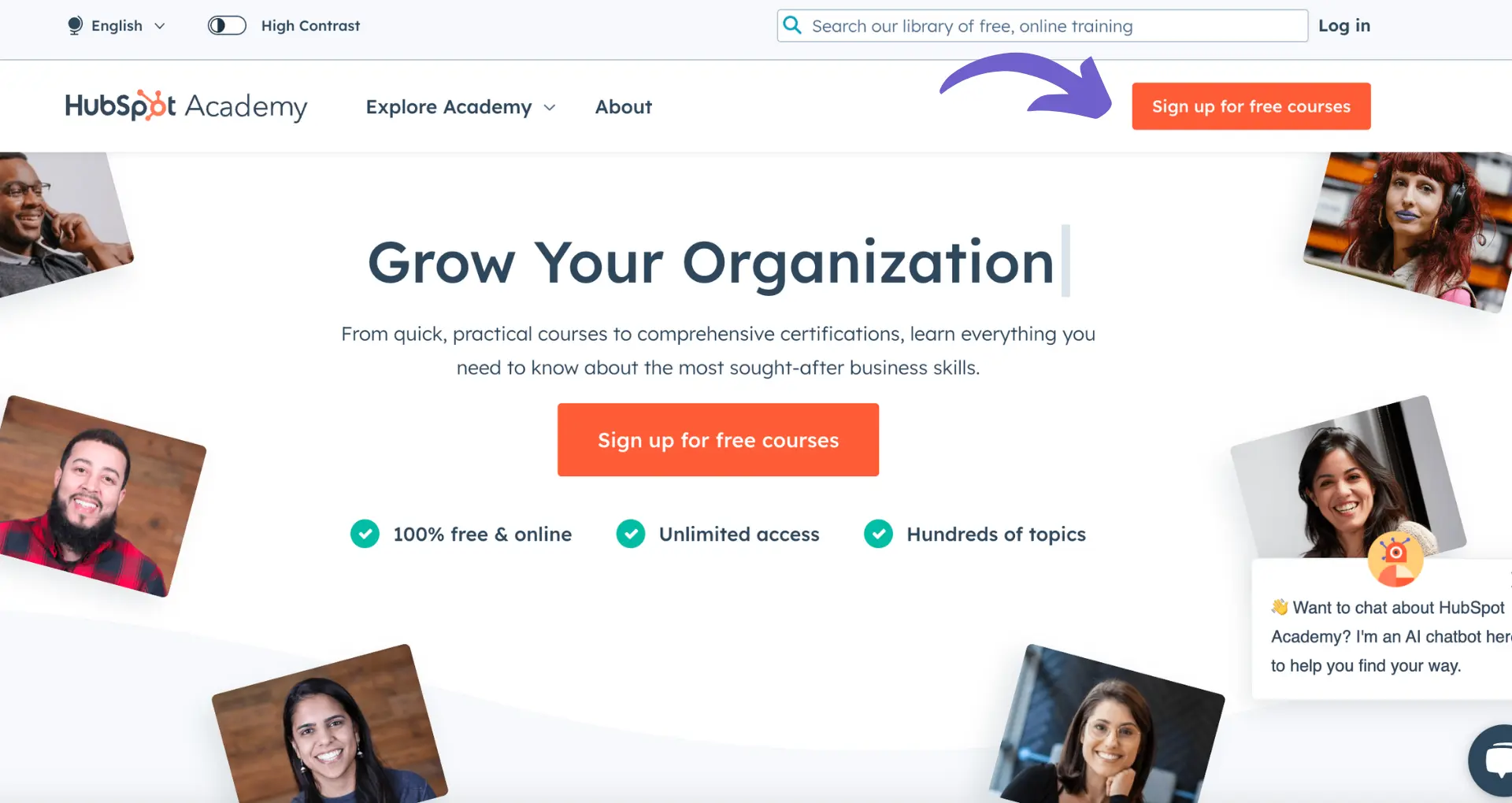

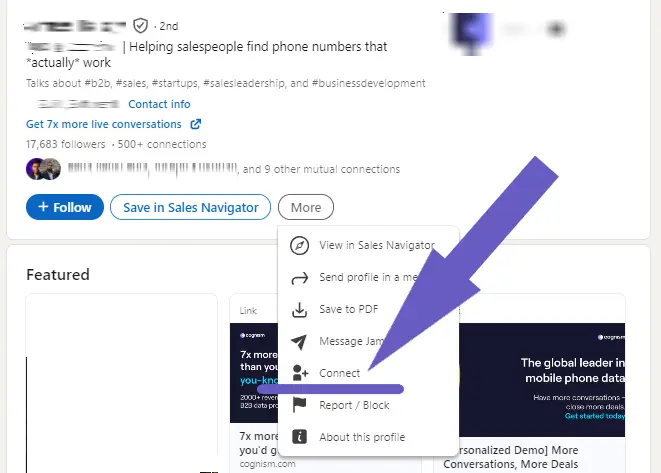







SOC 2 Type II, GDPR and CASA Tier 2 and 3 certified — so you can automate with confidence at any scale.
Bardeen is an automation and workflow platform designed to help GTM teams eliminate manual tasks and streamline processes. It connects and integrates with your favorite tools, enabling you to automate repetitive workflows, manage data across systems, and enhance collaboration.
Bardeen acts as a bridge to enhance and automate workflows. It can reduce your reliance on tools focused on data entry and CRM updating, lead generation and outreach, reporting and analytics, and communication and follow-ups.
Bardeen is ideal for GTM teams across various roles including Sales (SDRs, AEs), Customer Success (CSMs), Revenue Operations, Sales Engineering, and Sales Leadership.
Bardeen integrates broadly with CRMs, communication platforms, lead generation tools, project and task management tools, and customer success tools. These integrations connect workflows and ensure data flows smoothly across systems.
Bardeen supports a wide variety of use cases across different teams, such as:
Sales: Automating lead discovery, enrichment and outreach sequences. Tracking account activity and nurturing target accounts.
Customer Success: Preparing for customer meetings, analyzing engagement metrics, and managing renewals.
Revenue Operations: Monitoring lead status, ensuring data accuracy, and generating detailed activity summaries.
Sales Leadership: Creating competitive analysis reports, monitoring pipeline health, and generating daily/weekly team performance summaries.